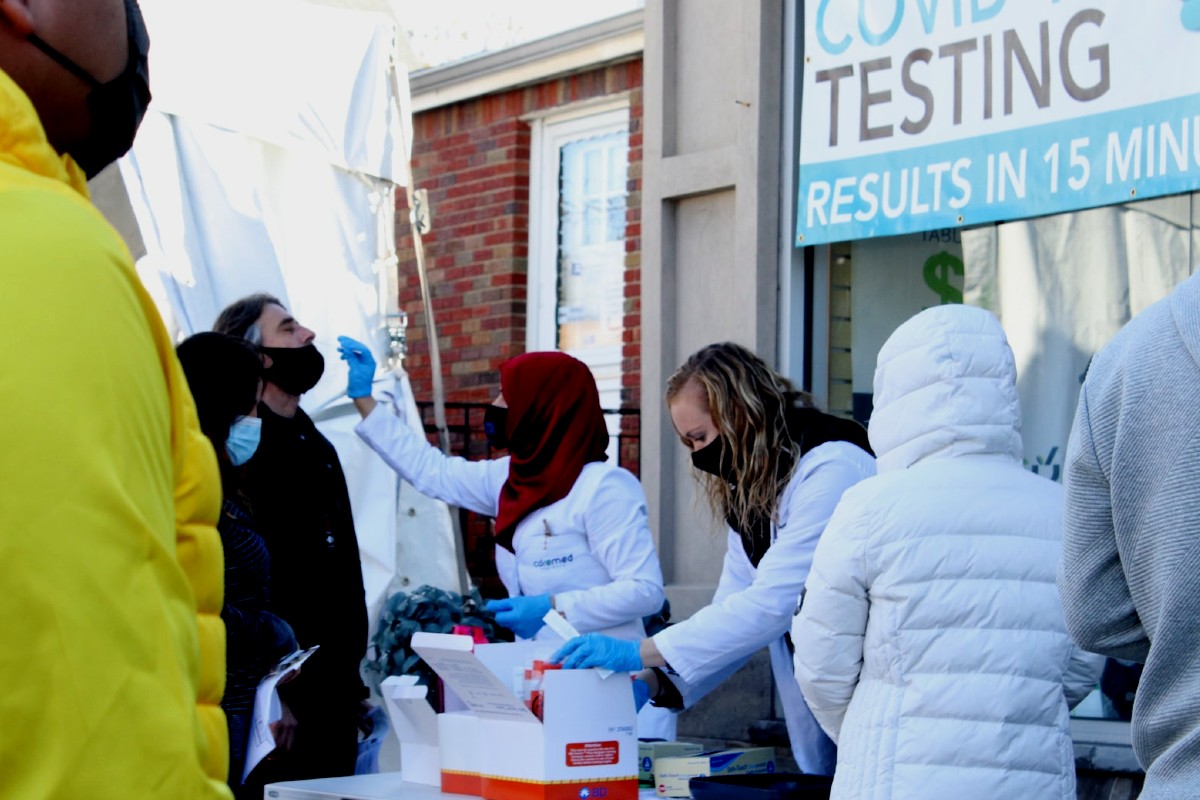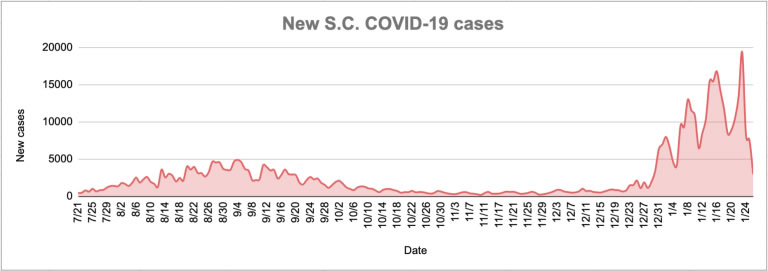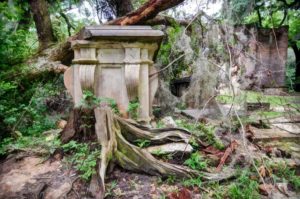STATEHOUSE REPORT | ISSUE 21.04 | JAN. 28, 2022
BIG STORY: DHEC’s reporting snag on COVID-19 data prompts questions
NEWS BRIEFS: Clyburn pushing S.C. judge for U.S. Supreme Court
LOWCOUNTRY, Ariail: Crisis
COMMENTARY, Brack: GOP must be smoking weed on abortion bills
SPOTLIGHT: Riley Institute at Furman University
FEEDBACK: Evidence should guide instruction; Ariail’s cartoons
MYSTERY PHOTO: Might be pretty tough
DHEC’s reporting snag on COVID data prompts questions

Staff reports | Questions are being asked about a week of delayed reporting of COVID-19 data at a time when the pandemic has been at the peak of its fourth surge.

State Sen. Margie Bright Matthews, D-Colleton, says she’s hearing lots of grumbling about the agency in charge of reporting the data, the S.C. Department of Health and Environmental Control.
“Someone really needs to go in and look at what is really going on at DHEC,” she said today. “I’m getting complaints.”
The agency has been unable to push full daily COVID updates since Jan. 24, reportedly due to a record number of tests being reported after a Jan. 21 update.
When asked whether the agency was embarrassed by being overwhelmed by data, DHEC spokesman Ron Aiken told Statehouse Report, “The unprecedented numbers of tests and cases generated by the omicron surge strained not just the state’s, but the entire country’s existing COVID-19 reporting infrastructure. We are no exception.
“No one wants delays of any kind, but the upside for the public of a temporarily challenging situation is that when issues such as this arise that expose a weakness, it affords you the opportunity to correct it in a responsible and responsive way that makes those process[es] and systems even more robust than they were before.”
At mid-week, DHEC resumed reporting of the numbers of new cases and deaths, but results for the number of tests administered and the percentage of positive test results — both of which are indicative of the severity of the pandemic now — are still delayed. A Thursday statement says reporting roadblocks have been removed and full results soon will be available.
“The delay was corrected Wednesday afternoon,” according to DHEC Public Health Director and Dr. Brannon Traxler in a statement to Statehouse Report this morning. “It began Monday due to an extraordinary volume of testing data funneling into a single software system. The long upload times of the large data files created a backlog that could not be accelerated, nor could the data waiting to be uploaded be analyzed and responsibly vetted.”
Recent reporting

The data that has been reported has been kind of a roller coaster. According to information released since last week:
- Jan. 27: 9,934 total new cases reported, with 7,274 confirmed. New deaths: 26, with 20 confirmed.
- Jan. 26: 4,085 total new cases, with 2,962 confirmed. New deaths: 19, with 16 confirmed.
- Jan. 25: 7.526 new cases.
- Jan. 24: 8,482 new cases.
- Jan. 23: 19,383 new cases.
- Jan. 22: 13,391 new cases.
When asked whether the recent surge is peaking, Traxler answered, “This is difficult to project, but it may be too early to say we’re nearing the end of the surge. Keep in mind that the first two cases [of the omicron variant] in South Carolina were reported just over a month ago. Now, we’re reporting more than 1,450 cases on our variant dashboard. That doesn’t include what other labs across the state are seeing and this only represents a fraction of the cases in South Carolina, since we’re only sequencing to look at the trends, rather than the total case counts.
“That said, we have seen some incremental decreases in the surge, meaning while cases are still increasing, they’ve been increasing at a lesser rate over the last couple of weeks or so. This is certainly promising, and we hope to continue seeing a decline.”
The Twitter story
 Throughout the week, DHEC has kept people apprised of developments related to the data delay via Twitter. Here is its timeline in tweets:
Throughout the week, DHEC has kept people apprised of developments related to the data delay via Twitter. Here is its timeline in tweets:
Jan. 24: Large volume
“Due to the large volume of test results we are receiving and the need to ensure that data released publicly are as accurate as possible, data reports from Thursday – Sunday will be delayed today, Monday, Jan. 24, and will be released tomorrow.”
Jan. 24: Regrets delay; Patience
“DHEC regrets this delay and appreciates the public’s patience in our efforts to provide accurate COVID-19 data so South Carolinians can have as much information as possible during this unprecedented pandemic.”
Jan. 24: “Inadvertently published”
After the agency updated its webpage with incorrect numbers, it tweeted:
“The dates on our main page were staged earlier today before we were aware of the delay. This change was inadvertently published when the top page alert was added about the data delay. The dates have been corrected. This data is the same data that was published on Friday, 1/21.”
Jan. 25: Not impacting individual results
“It is also important to know that these data processing problems are not impacting individuals receiving their results or the prioritized case investigations through which DHEC provides guidance to people in high-risk settings who have tested positive and their contacts.”
Jan. 26: Still not able to release
“DHEC is not yet able to release percent positivity numbers, since we are still importing negative results into our system. We expect to begin reporting these numbers in the coming days.”
Jan. 26: Big volume
“The processing delay was due to an extraordinary volume of testing data funneling into a single software system.”
“DHEC receives test results from labs and healthcare providers through electronic and spreadsheet reporting, in a 50/50 percent submission ratio.”
“Electronic reporting is preferred, but not all labs and providers are able to electronically transfer test results directly into our reporting system. Some submit spreadsheets to DHEC that must be uploaded into our reporting system.”
“With 15 million reports, containing some duplicates from labs and providers, it takes time to load, clean, and date the test results accurately for reporting.”
“DHEC staff have been working non-stop, 24 hours a day to resolve the processing issue and develop a permanent fix to prevent future data delays.”
Jan. 27: Import problems
“Today, DHEC announced 9934 new cases of COVID-19 (7274 confirmed, 2660 probable), 26 new deaths (20 confirmed, 6 probable). See today’s updated COVID-19 and vaccine data at https://scdhec.gov/covid19data.
“[NOTE: DHEC is not yet able to release percent positivity numbers, since we are still importing negative results into our system. We expect to begin reporting these numbers in the coming days.]”
Jan. 27: Backlogs cleared
“DHEC is pleased to announce that Premier Medical Laboratory Services and DHEC’s other testing vendors are reporting all backlogs have been cleared and turnaround times for COVID-19 test results are back to the standard 48-hour time frame.”
Andy Brack and Skyler Baldwin, a reporter with the Charleston City Paper, contributed to this story. Have a comment? Send to: feedback@statehousereport.com
Clyburn pushing S.C. judge for U.S. Supreme Court
Staff reports | U.S. District Judge Michelle Childs, currently under consideration for a federal appellate court seat, reportedly is on the shortlist of candidates to fill a vacancy on the U.S. Supreme Court following news this week that Justice Stephen Breyer would retire. Powerful U.S. Rep. Jim Clyburn, D-S.C., is hoping for her nomination and confirmation.

On Thursday, President Joe Biden announced he would nominate the first Black woman to the high court, keeping a promise made in February 2020 just before the S.C. presidential primary. The next day, Biden earned Clyburn’s key endorsement and then swept the state, eventually going on to the presidency.
During a Thursday press conference, Clyburn said he pushed Childs’ elevation from the South Carolina federal bench to a federal appellate court in Washington, D.C. shortly after the 2020 election because he thought she was “Supreme Court material.” The congressman said he had not spoken to Biden about Childs as a potential pick for the Supreme Court.
Childs is among three judges reported Thursday to be on the president’s radar, according to The New York Times. The others: U.S. Circuit Judge Ketanji Brown Jackson, who sits on the D.C. circuit, and California Supreme Court Justice Leondra Kruger.
In other recent news:
![]() McMaster signs final congressional redistricting plans into law. Gov. Henry McMaster on Thursday signed into law a new congressional redistricting plan based on the 2020 census. While it isn’t drastically different from the previous map, it increases potential Republican strength in the coastal First District. The law is expected to draw a court challenge.
McMaster signs final congressional redistricting plans into law. Gov. Henry McMaster on Thursday signed into law a new congressional redistricting plan based on the 2020 census. While it isn’t drastically different from the previous map, it increases potential Republican strength in the coastal First District. The law is expected to draw a court challenge.
Senate to continue debate on medical marijuana proposal. S.C. Sen. Tom Davis, R-Beaufort, on Thursday fended off opponents of his medical marijuana bill during the second day of debate over the legislation. More debate is scheduled for next week on the measure, which Davis says will not lead to the “slippery slope” of legalizing marijuana broadly.
Spearman lobbies for big pay boost for teachers. State Superintendent Molly Spearman urged lawmakers to give public school teachers substantial pay raises in the coming fiscal year. She also said that no teacher should start at less than $40,000 per year. Meanwhile, a House proposal calls for teachers-in-training to get a $7,500 bonus after they graduate.
S.C. bill seeks to criminalize vax status requests. House Bill 4848, which would make it a crime to ask about someone’s COVID-19 vaccination status, is sponsored by six GOP lawmakers, including S.C. Rep. Sandy McGarry, R-Lancaster, who has experience working in the medical field.
S.C. Senate votes to end state control of hospital expansions. South Carolina hospitals will no longer need state permission to build new facilities, expand or purchase equipment after state senators voted to get rid of the requirement Jan. 25. The measure would end a 51-year requirement.
S.C. lawmakers vow to address critical race theory. S.C. House Education and Public Works Committee members promised Wednesday to take their time crafting new rules for public school K-12 teachers in the wake of the culture war backlash surrounding college-level discussions on how race and the nation’s founding as a slave colony impacts daily lives, known as critical race theory.
Momentum grows for legislature to pass hands-free driving bill. The proposed Hands-Free Act would levy penalties for drivers using their phones in their hands while on the road.
- Want more headlines every business day that are like this? Visit our friends at SC Clips.
Crisis

Cartoonist Robert Ariail always has an interesting take on what’s going on in South Carolina. Love the cartoon? Hate it? What do you think: feedback@statehousereport.com.
GOP must be smoking weed on abortion bills

By Andy Brack, editor and publisher | Domineering Republican men in the legislature who are making decisions about women’s bodies must be just plain arrogant. If they harbor any notion they are helping poor and young women in South Carolina by curbing abortions, they’re smoking the weed that the state Senate has been talking about this week.
 If our state legislators keep pushing soulless abortion bills to score political points with their voting base, they’re sentencing too many young women to pain, suffering and horror. Why? Because legislating against abortions won’t make them go away. They’ll just cockroach them into the shadows.
If our state legislators keep pushing soulless abortion bills to score political points with their voting base, they’re sentencing too many young women to pain, suffering and horror. Why? Because legislating against abortions won’t make them go away. They’ll just cockroach them into the shadows.
Before proceeding any further, here’s the email address for your hate mail: feedback@statehousereport.com.
Back to it: Men of the legislature should get out of the way and let South Carolina’s women use their own brains to figure out what’s best for their bodies. Those who want to give birth will and may consider adoption. Those who need to abort for their own health and safety or if they know they can’t offer a nurturing home to a child should be able to take advantage of options offered by modern medicine and science.
On Wednesday, three male Republican state senators on the Senate Medical Affairs subcommittee – Richard Cash of Anderson, Tom Corbin of Travelers Rest and Billy Garrett of Greenwood – gave subcommittee approval to two abortion bills with harrowing consequences. Democrats Margie Bright Matthews of Walterboro and Marlon Kimpson of Charleston voted against the measures.
One bill, S. 988, would define the beginning of life at fertilization and, according to the Associated Press, hold that “any doctor who performs an abortion after that point could face similar charges to murder.” The measure, sponsored by Cash, is considered an abortion ban, but would allow birth control and contraception as well as abortions if a mother’s life were in danger or an egg was fertilized outside of the womb. If approved, this “trigger law” would take effect if the U.S. Supreme Court, which is taking a serious look at the landmark Roe v. Wade abortion rights decision, were to turn abortion rights over to states.
Another proposal, S. 907, calls for doctors to give a written statement that drug-induced abortions could be reversed after one dose of a two-dose drug, which opponents say is medically inaccurate and unproven.
Last year, the General Assembly passed a law banning most abortions by requiring ultrasounds for a “fetal heartbeat” and, if detected, bans abortion except in cases of rape, incest or danger to the mother’s life. That measure now is on hold pending a constitutional review by a federal court.
Such early movement in this year’s session of anti-abortion legislation is frightening, particularly given the consequences.
“It is scary how extreme our legislators have gotten in their efforts to deny people access to abortion care in South Carolina,” said Ann Warner, CEO of the Women’s Rights and Empowerment Network in Columbia. “It’s alarming that the Senate Medical Affairs subcommittee chose to even take these bills up, let alone pass them.
“I am appalled that so many legislators are willing to ignore science, common sense and public will in an effort to advance a radical agenda.”
Vicki Ringer, director of public affairs of Planned Parenthood South Atlantic, said under the “trigger” proposal, any doctor who provided an abortion of somone trying to end a pregnancy could be charged with murder and face the death penalty if the law goes into effect.
“This is no longer a hypothetical threat,” she said. “The legal right to have an abortion is being dismantled right now, before our eyes. … Without the courts to shield us from the most egregious laws — as they did last year with the state’s six-week abortion ban — our fight is no longer only a political one confined to the halls of the Statehouse. We are fighting for our lives.”
“No matter your personal views on abortion, we should all agree that politicians shouldn’t criminalize our private medical decisions or the doctors providing this care. Each person should be able to get quality, affordable health care, no matter who they are, where they live or how much money is in their bank account — without interference from politicians.”
Damn right.
Andy Brack, editor and publisher of Statehouse Report, also is publisher of the Charleston City Paper. Have a comment? Send to: feedback@statehousereport.com.
Riley Institute at Furman University
 The public spiritedness of our underwriters allows us to bring Statehouse Report to you at no cost. This week’s spotlighted underwriter is Furman University’s Riley Institute, which broadens student and community perspectives about issues critical to South Carolina’s progress. It builds and engages present and future leaders, creates and shares data-supported information about the state’s core challenges, and links the leadership body to sustainable solutions.
The public spiritedness of our underwriters allows us to bring Statehouse Report to you at no cost. This week’s spotlighted underwriter is Furman University’s Riley Institute, which broadens student and community perspectives about issues critical to South Carolina’s progress. It builds and engages present and future leaders, creates and shares data-supported information about the state’s core challenges, and links the leadership body to sustainable solutions.
Launched in 1999, the Institute is named for former South Carolina Governor and former United StatesSecretary of Education Richard W. (Dick) Riley. It is committed to nonpartisanship in all it does and to a rhetoric-free, facts-based approach to change.
- Learn more about the Riley Institute.
- Also learn more about the Riley Institute’s Center for Education Policy and Leadership.
Evidence should guide instruction
To the editor:
![]() Professor Paul Thomas (“Science backs balanced teaching of reading, not intensive phonics”) stated here that “the “science of reading” movement is causing far more harm than good.” He cited one study conducted in the U.K. that was unsupportive of systematic and explicit instruction in phonics. What he failed to share was that since the U.K. introduced the phonics screening check in 2012, the percentage of Year 1 pupils meeting the standard in reading rose from 58 percent to 82 percent, with 92 percent of children achieving this standard by Year 2. This data does not indicate harm – it indicates benefit.
Professor Paul Thomas (“Science backs balanced teaching of reading, not intensive phonics”) stated here that “the “science of reading” movement is causing far more harm than good.” He cited one study conducted in the U.K. that was unsupportive of systematic and explicit instruction in phonics. What he failed to share was that since the U.K. introduced the phonics screening check in 2012, the percentage of Year 1 pupils meeting the standard in reading rose from 58 percent to 82 percent, with 92 percent of children achieving this standard by Year 2. This data does not indicate harm – it indicates benefit.
Federal and state laws (ESSA, IDEA, Act 284 and Act 213) require systematic and explicit instruction in five essential components of reading (phonemic awareness, phonics, vocabulary, fluency and comprehension) because when this type of instruction is provided all but 2-5 percent of students can learn basic reading skills in first grade, even in populations where the incidence of poor reading is very high (Mathes et al., 2005). Moreover, only 2-7 percent of all students identified as being at-risk continue to experience reading difficulties after receiving intensive, evidence-based reading intervention in the first two years of school (Mathes et al., 2005; McMaster et al., 2005; O’Connor et al., 2005 Torgeson, 2000; Torgeson et al., 1999; Velluntino et al., 1996). Yet roughly 66 percent of our state’s 4th graders score at basic and below basic levels of reading (NAEP, 2019) and 14 out of 20 teacher preparation programs in South Carolina earned a grade of C or below (NCTQ, 2020) because they do not teach the most current evidence about how children learn to read. In Mississippi, however, none of their teacher preparation programs earned a grade of C or below and they rank No. 1 in the nation for gains in 4th grade reading. How did Mississippi do it? Using methods and curriculums that have evidence that students should be successful.
The two most prominent reading curriculums in South Carolina are based on a balanced literacy approach and have failing marks. Neither Fountas and Pinnell nor Lucy Calkins Units of Study met expectations for grade kindergarten through 5th grade in any area (EdReports, 2020). These two programs actually received the lowest ratings ever given for K-2 curricula in English/language arts, and are among the three lowest for ELA in grades 3-8.
So, why is S.C. financially supporting teacher preparation programs that do not teach the most current, evidence based information about reading instruction? Why are state funds used to purchase balanced literacy curriculums that have the lowest possible rating? If you are looking for the answer as to why two thirds of S.C.’s students are struggling it is because teachers are not taught the evidence and therefore evidence does not guide instruction.
– Robin McFadden, Columbia, S.C.
On Ariail’s cartoons
To the editor:
This was the best part of the report. Short, direct and meaningful!
– Miriam Mitchell, Seabrook, S.C.
Send us your thoughts
We receive a few comments a week and look forward to publishing. But often we can’t because we can’t verify the identity of the writer. To be published, you’ve got to provide us with contact information so we can verify your letters. Verified letters to the editor are published weekly. We reserve the right to edit for length and clarity. Comments are limited to 250 words or less. Please include your name and contact information.
- Send your letters or comments to: feedback@statehousereport.com
Might be tough

A reader sent in this mystery photo, which might prove to be pretty tough. Hint: It’s along coastal South Carolina. Send your guess to feedback@statehousereport.com — and remember to include your name, home city and contact information.

Last week’s mystery, “Surrounded,” showed a crypt near the Old Sheldon Church ruins in Beaufort County. Several readers correctly identified it, including Henry Eldridge of Tega Cay; George Graf of Palmyra, Va.; Elizabeth Jones of Columbia; Allan Peel of San Antonio, Texas; Faith Line of Anderson; David Lupo of Mount Pleasant; and Bill Segars of Hartsville.
Jones shared: “The ruins of Old Sheldon Church in Yemassee, S.C., also include the cemetery with its tombs, mausoleums and crypts from the 1750s into early 1800s. The original Prince William’s Parish Church was erected beginning in 1753. It was completed but burned by Loyalists during the Revolutionary War. The roof and interior were restored, but the church was burned or destroyed again by federal troops during the Civil War.
“The church began being called Sheldon, and later Old Sheldon, after Colonel William Bull’s plantation of the same name. Colonel Bull assisted [Georgia’s James] Oglethorpe in laying out the grid of downtown Savannah Ga., but I digress. Colonel Bull is buried in the churchyard of Old Sheldon.”
- Send us a mystery. If you have a photo that you believe will stump readers, send it along (but make sure to tell us what it is because it may stump us too!) Send to: feedback@statehousereport.com and mark it as a photo submission. Thanks.
ORDER NOW: Copies are in Lowcountry-area bookstores now, but if you can’t swing by, you can order a copy online today.
ABOUT STATEHOUSE REPORT
Statehouse Report, founded in 2001 as a weekly legislative forecast that informs readers about what is going to happen in South Carolina politics and policy, is provided to you at no charge every Friday.
- Editor and publisher: Andy Brack, 843.670.3996
Donate today
We’re proud to offer Statehouse Report for free. For more than a dozen years, we’ve been the go-to place for insightful independent policy and political news and views in the Palmetto State. And we love it as much as you do.
But now, we can use your help. If you’ve been thinking of contributing to Statehouse Report over the years, now would be a great time to contribute as we deal with the crisis. In advance, thank you.
Buy the book
Now you can get a copy of editor and publisher Andy Brack’s We Can Do Better, South Carolina! ($14.99) as a paperback or as a Kindle book ($7.99). . The book of essays offers incisive commentaries by editor and publisher Andy Brack on the American South, the common good, vexing problems for the Palmetto State and interesting South Carolina leaders.
More
- Mailing address: Send inquiries by mail to: P.O. Box 21942, Charleston, SC 29413
- Subscriptions are free: Click to subscribe.
- We hope you’ll keep receiving the great news and information from Statehouse Report, but if you need to unsubscribe, go to the bottom of the weekly email issue and follow the instructions.
- Read our sister publication: Charleston City Paper (every Wednesday in print; Every day online)
- © 2022, Statehouse Report, a publication of City Paper Publishing, LLC. All rights reserved.



